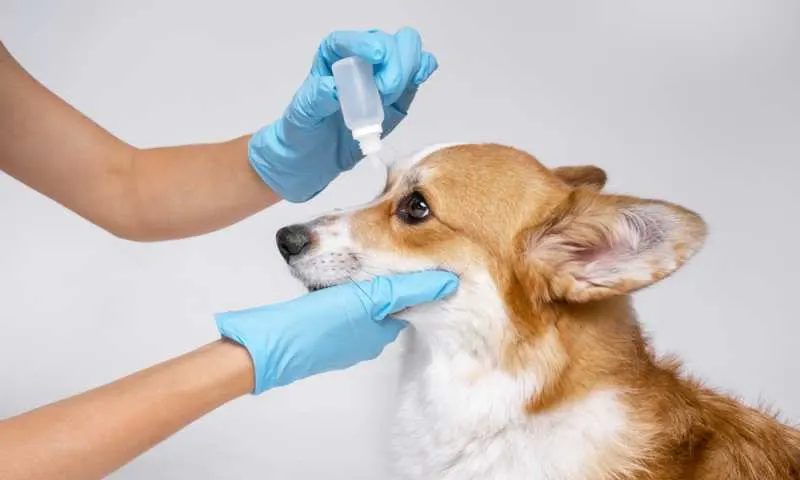Corgis are lovely dogs that will keep you company whenever you feel sad. Corgis always put your desires and wishes above theirs, as they feel obligated to help you out whenever you need something. But what happens when they need your help more than you need theirs?
As it turns out, several genetic issues can occur in all corgis, harming them in more ways than one. So what are the most famous Neurological disorders in Corgis, and how can you help them out when they are suffering from one?
When discussing neurological disorders in corgis, the most notorious ones are the eye problems for corgis.
What specifically happens to corgis eyes? How can many different neurological disorders affect corgis when discussing their eyes? Can some of those issues lead them to become blind?
You need to educate yourself thoroughly before adopting a corgi, as some issues can change their lives. So stay on top of your game, and learn how to help your corgis when they suffer from neurological disorders!

Exercise With Your Corgi Daily!
If you want to keep your corgis healthy throughout their lives, you will need to, first and foremost, offer them a balanced diet. It doesn’t matter if you have all day long to spend with your corgi or you have a small amount of time at your disposal; make sure that you offer them healthy food.
Head to your local pet shop and ask the personnel that works there to recommend you with the best commercial dog food for your corgi. Every dog has different eating habits and requirements; some dogs eat more, some less – find the best solution for your corgis.
To ensure that your corgis stay healthy, after your corgi finishes its every meal, put a leash on it and take it for a walk. If your corgi is only eating food without exercising, soon enough, some problems might start to manifest from within your corgi.
The most famous issue being obesity. Every human and animal needs to eat a moderate amount of food every day, and they need to stay active on top of that. Food is the only way for organisms to get their fuel and sustain themselves by giving them the energy to move.
If you put your corgi in a spot where it only eats but never exercises, you will have an unhealthy and fat dog soon enough. There is a thin line between being fat and obese, and you should never play with your corgis’ health when talking about their body weight.
Living in a house with a large backyard will put you in an easier spot to ensure that your corgi can go outside whenever it finishes its meal. Unfortunately, corgi owners that live in a small flat don’t have this luxury, as your corgi doesn’t have the opportunity to leave that enclosed area.
Put a leash around your corgi and take it every day for a walk, once in the morning and once in the evening, when you return from work. Corgis’ metabolism will properly operate if it eats healthy food and exercises soon after ingesting some food. Don’t play with their health!
Regrettably, there are some issues that you can’t fully predict or stop when dealing with your corgis’ health. The genetic predispositions of all corgis are unique for them all – as I’ve mentioned before, there are no two of a kind in the realm of dogs, especially corgis.
Whenever a dam gives birth to puppies, it will transfer the “data” of both the mother and father. That data is what’s known as deoxyribonucleic acid, or in short, DNK, which holds all of the necessary information that allows puppies to grow correctly.
Mixing two Pembroke Welsh Corgis will lead to baby Pembrokes, but if you mix a Pembroke with a Cardigan Welsh Corgi, you will get a Cardigan Pembroke Corgi. If you want to know more about the corgi breed, there is an in depth article discussing just that – click on the link here!
If a corgi gives birth to other corgis, you can bet that the babies will grow in the same fashion as their mother and father did. Interestingly enough, the scientists believe that corgi babies gain their mother’s intelligence and their father’s body proportion.
Unfortunately, corgis don’t pass down only good quality genes; most of the time, some malicious genes get transferred also. In most cases, corgis won’t suffer from neurological disorders, but those diseases can strike some corgis.
Listen carefully, as I’ll dissect the two most famous neurological disorders that can potentially manifest in corgis:

Primary Lens Luxation
Mother Nature was ruthless when she designed how corgis’ bodies will function when it grows up. She allowed them to stay fairly small with their short legs and long bodies, but that enabled them to remain strong and relatively fast and agile.
You can precisely predict how big and tall your corgis will get, but you can’t predict if it will suffer from neurological disorders. As it turns out, primary lens luxation (PLL) is a disease that most dogs can inherit, especially corgis, that enhances corgis’ likelihood of getting eye problems.
To be more specific, there are tiny fibers that hold the corgis’ lens in place, and if those fibers start to fall out from the eye, it will damage their eyesight. The most common pattern in which the lens is separated from the eye in corgis is falling forward.
If that happens, your corgi might start to feel excruciating pain in its eyes, to the point of making them aggressive towards everyone. You will need to pay close attention if your corgi starts to behave oddly, as it might’ve started to suffer from primary lens luxation.
Luckily, it’s treatable. Ensure that you have the phone number of your local veterinarian to appoint a meeting with them. Take your corgi as soon as possible to him so that the veterinarian can run some scans and determine the exact problem with your corgi.
If it turns out that your corgi has started to suffer from PLL, a surgical procedure will be necessary, as the pain won’t go away. Imagine that you have a leaf stuck on your eye, and it won’t come off, pulling the delicate part of the eye with every move. Painful, isn’t it?
That is what your corgi is experiencing every second, from dusk till dawn, until the problem is resolved with a surgical procedure. The success rate of the surgery is pretty high, and it will relieve most of the pain for your corgi but will make their eyesight worse.
Trust me, the overall health of your corgi should be the most important for all of you – don’t be scared and say yes to that procedure if it’s necessary!

Progressive Retinal Atrophy
Contrary to the condition listed above, there is another neurological disorder that targets the corgis’ eyes. Unlike PLL, progressive retinal atrophy (PRA) is a genetic condition that inevitably leads them to become blind when manifested within corgis.
As you’ve probably guessed, this is the most miserable condition that can happen to our beloved corgis. To become blind effectively means that your corgi can’t use their eyes ever again. As a result, all colors, shapes, faces, and loved ones, are turned into a pitch-black void.
If this neurological disorder occurs in one of your corgis, you will need to help them out as much as possible, starting with:
- Your blind corgi will need to have some kind of device that will keep them safe in the dark from then on. First, head to your local pet shop and ask them for some advice – most of the time, they will recommend that you buy a comfy suit for your corgi.
- Living in constant darkness can get troublesome, as corgis that are blind can’t see what’s directly in front of them. Putting some clothes on them will help them out whenever they find themselves in a sticky situation, where they might hit something.
- Most importantly, it doesn’t matter if you live in a small apartment or a large house with your corgi; make sure that you remove all obstacles for your corgi. Everything that will make them potentially fall over or cut them is dangerous – keep them safe!
- All dogs and especially corgis, have a strong sense of smell. Therefore, they will need to use their nose as a primary device for navigation. Their ears will be of use as well, as they will need to hear everything close to them.
- Ensure that you offer them enough vitamins and minerals necessary for keeping their immune system healthy. If your corgis get blind, you should consider offering them some vitamin supplements to aid their overall health.
If your corgi starts to suffer from PRA, you will need to support it more than ever. Take your corgi every day for a walk to the dog park, where it can interact with other dogs. Stay close to them, as you will need to monitor their every move, as blindness will be a challenging obstacle to overcome.
Suffering from any neurological disorder might lead your corgi to feel sad, leading further to a potential depression. As you all know, one disease quickly leads to another. Ensure that you interact with your corgi as much as possible to keep it distracted from those disorders!

Neurological Disorders In Corgis – Final Words
All dogs, especially corgis, need to have a long and healthy life. Providing corgis with a moderate amount of food, fresh air, and exercise isn’t enough, as corgis might develop some unavoidable diseases.
Those issues are known as Neurological disorders in corgis and are mainly responsible for developing eye problems for corgis. Every predisposition your corgis will have is directly connected to their genetics. Sometimes, corgis genes can be malicious, leading them to become blind.
You will need to stay close to your corgi if it becomes blind, as it might become depressed if it realizes that it can’t live its life to the fullest. Of course, it’s always tragic when corgis suffer from neurological disorders, but don’t lose hope and try to entertain your corgi as much as possible!
Take your corgi to the veterinarian occasionally and ask him to run some scans. You can never know when your corgi might suffer from something. Remember, safety comes first!
Learn More: Corgi Health Problems: Most Common Diseases In Corgis

